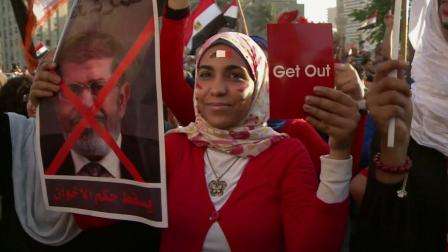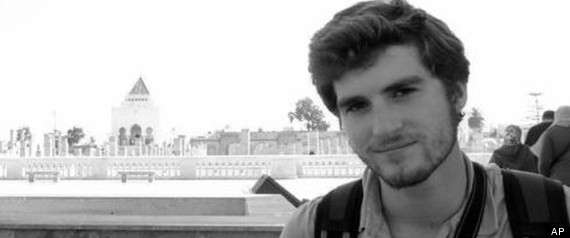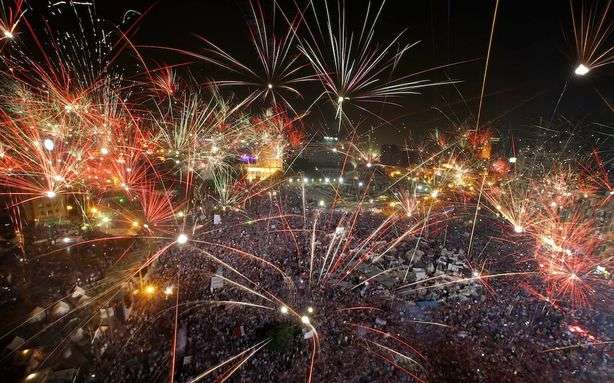Egypt: The people get rid of Morsi
The Egyptian people have taken to the streets again in unprecedented numbers, this time to oust the first democratically elected president (though by a small margin), the Muslim Brotherhood's Mohamed Morsi, who had served only a year. Clearly Morsi was not transformed by democratic election into a representative leader. His rule was heavy handed and arbitrary, serving not the people but himself and the Muslim Brotherhood, and was not seeming all that much better than Hosni Mubarak, the 30-year dictator the revolution of January 25, 2011 had deposed. The Muslim Brotherhood is not out of the picture, but its public support seems shaken.
Things look different now from a year ago. The turbulent voice of the Egyptian people when they take to the streets is a powerful expression of revolutionary and democratic fervor. We've seen how the voices of Tarrir Square can impose the echoing cry of إرحل/
irhal ("leave") throughout the country and bring down a leader. But while driving out a thirty-year dictator was a very good thing, ousting an elected leader sets no democratic precedent.
Morsi's aggressive but ephemeral presidencyWhat did Morsi do wrong? Plenty, it turns out. For an example offensive to foreigners, he appointed an Islamic fundamentalist associated with al-Gama'a al-Islamiyya, the group behind the 1997 Luxor massacre, as governor of Luxor province. The Minister of Tourism resigned as a result. A similar case is the recent trial and conviction in absentia of 43 foreign NGO workers; this goes back to before Morsi took office; but Egyptian rights groups have protested the Muslim Brotherhood's imposing of legal restrictions on their freedom to operate.
There are recent reports of anti-American feeling, possibly spurred by the increasing polarization under Morsi, which is illustrated by the sad fact that
Andrew Pochter, a 21-year-old American college student in the country to teach English to children and improve his Arabic, was stabbed to death June 29 while watching demonstrations in Alexandria. Pochter seems to have been an inspiring and idealistic young man: too often mass action hurts the wrong people.
 ANDREW POCHTER [AP photo]
ANDREW POCHTER [AP photo]Morsi did a couple of good things at the outset to build confidence abroad. He helped end the fighting in Gaza and negotiated a $4.8 billion IMF loan. But domestically he quickly became overbearing. A recent article by
Ziad Akl in the Egyptian
Daily News listing internal problems of the Morsi presidency points out his earliest action was to exercise arbitrary (and confused) power over the Constitutional Court (المحكمة الدستورية العليا), showing "clear signs of vulgar abuse of power" from day one. Morsi made constitutional changes designed to secure the Muslim Brotherhood's power. Another cause of Morsi's downfall was economic. He did nothing to right the drop in GNP that came with the revolution; in fact it has dropped further. Things were better under Mubarak, and Morsi might have done better to stick to Mubarak's programs if he could not improve on them.
In a bold move to reform the Egyptian military Morsi forced older Mubarak-era high ranking officers, headed by Field Marshall Muhamad Hussein Tantawi, into retirement, and replaced them with younger ones. It doesn't look like this is going to make much difference now. The inbred, hereditary elite that is the top echelon of the Egyptian military no doubt remains influential. Morsi removed the unpopular prosecutor, opened the doors for a re-trial of Mubarak and other officials, and granted himself and the Constituent Assembly (الجمعية التأسيسية) immunity from rulings by the country's pro-Mubarak judiciary. Critics feared pro-Mubarak judges would dissolve the Constituent Assembly, just as they had dissolved the country's first democratically elected parliament before Morsi was elected president in June. At first Morsi didn't touch Abdel Meguid Mahmoud, the prosecutor general responsible for lenient sentences for Mubarak and others of his regime, but then he ousted him.
All Morsi's actions tended to increase the polarization between groups.
The enduring power of the Egyptian military Democracy has a special obstacle in Egypt: the military. This is a powerful force for stability, but also a self-serving elite, with a vast network of businesses it owns. With the ousting of Morsi, the military is taking over again as when Mubarak resigned. The Egyptian military is deeply entrenched. Removing presidents won't get to it. It's highly political, but ideologically opportunistic and flexible. It was not dislodged by the revolutionary spirit of two and a half years ago after Mubarak resigned: instead it took control, and would not leave till Morsi became president. Can anything dislodge it? As a recent
NY Times article put it, the Egyptian military "has one primary objective. . . preserving national stability and its untouchable realm of privilege within the Egyptian state." And maybe not in that order. The temporary leader they have put in, the top judge Adly Mahmud Mansour, seems a mere front man.
 ADLY MAHMOUD MANSOUR
ADLY MAHMOUD MANSOURThis objective has been reasserted now. Here are two
Tweets July 4 from Sharif Abdel Kouddous,* the
Nation Institute Fellow and "Democracy Now" reporter in Egypt: "Senior MB [Muslim Brotherhood] member says entire Guidance Council has been arrested. Troops broke into members' homes. 'We're back to Mubarak's regime.'" Then a few minutes later Sharif tweeted: "Senior MB member: Army/feloul will use anti-Morsi anger 2 return 2 power then crackdown on anybody who speaks out once they're firmly rooted." (Feloul = remnants of the Mubarak regime.)
The Revolution or January 25 did not get rid of these forces. It's back to square one. Mubarak is gone; Morsi is gone. Now the Egyptian people have little more faith in the Muslim Brotherhood than in the feloul. But perhaps ironically, the Egyptians in the streets have welcomed the military as saviors and old friends. (The military did support the people after the revolution, but will support anybody that's expedient.)
So what is different now? The country is in disorder, on the verge of financial collapse. Transportation is at a standstill. Tourism, an important source of national income, is obstructed.
 TAHRIR SQUARE AFTER MORSI'S RESIGNATION (Amr Nabil NYTimes]
TAHRIR SQUARE AFTER MORSI'S RESIGNATION (Amr Nabil NYTimes]Nonetheless the atmosphere was joyous in Tahrir Square, Egypt's symbolic theater of political action, when Morsi reluctantly stepped down. Now it is time for another election. But how will that go? Will the revolutionary fervor lead to a more democratic leader now, or will the polarization that increased under Morsi lead to more chaos? How does a revolution transform itself into a democracy? For one thing, by writing a constitution. And the constitution was one place where the new Egyptian revolution went awry, and this is just one of the basic fundamentals that need to be worked on.
_________________________________
*See the article in
The Nation by Sharif Abdel Kouddous, "What Led to Morsi's Fall—and What Comes Next?" Further details and background about flaws of Morsi's presidency and dangers of the new military takeover will be found in the article, "Coup in Egypt: what does it mean?" by Fred Goldstein in
Workers World. The Middle East Research and Information Project sums up the situation in Egypt as of July 10, 2013 in their
MERIP blog, "Egypt in Year Three."





